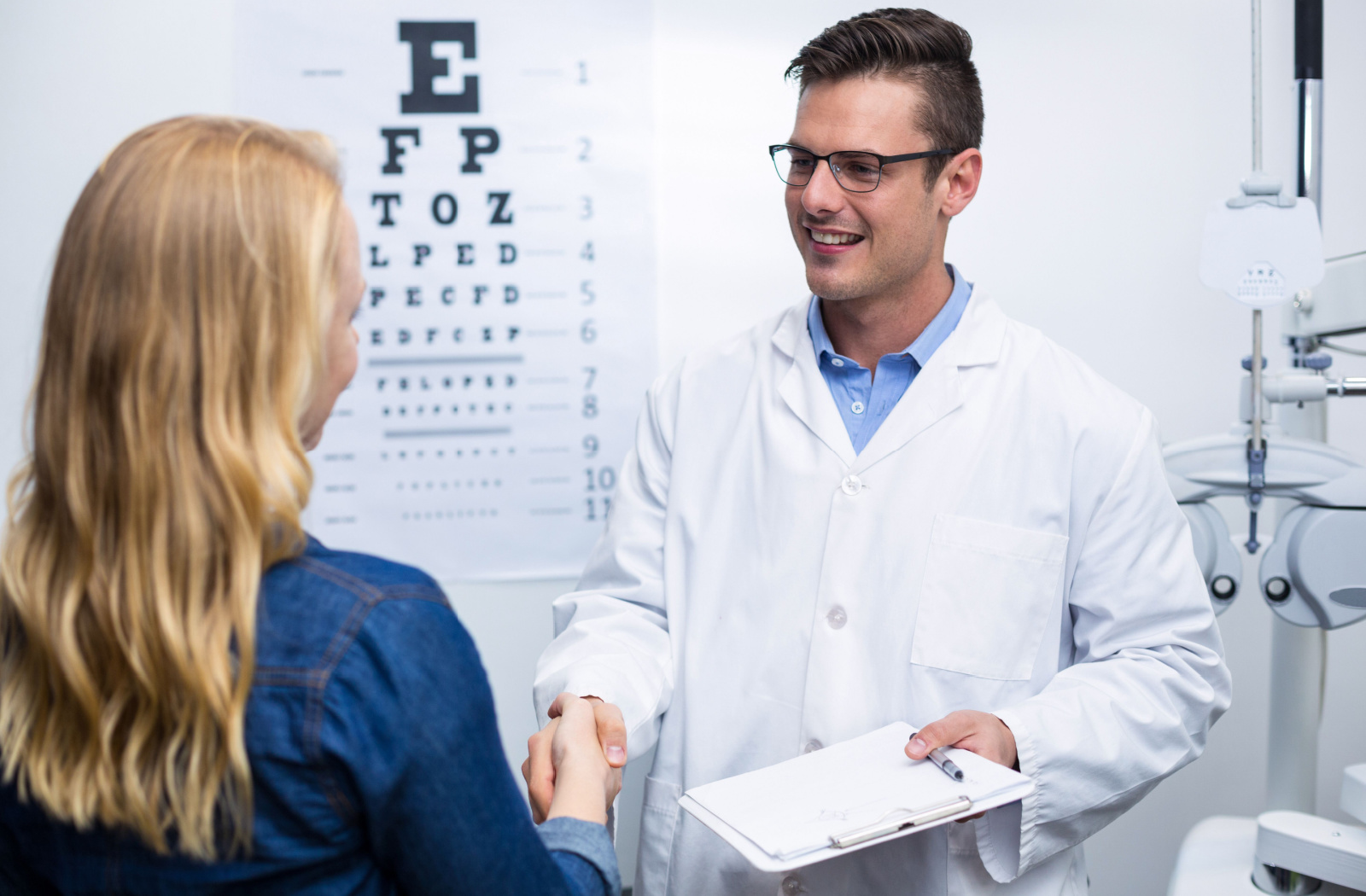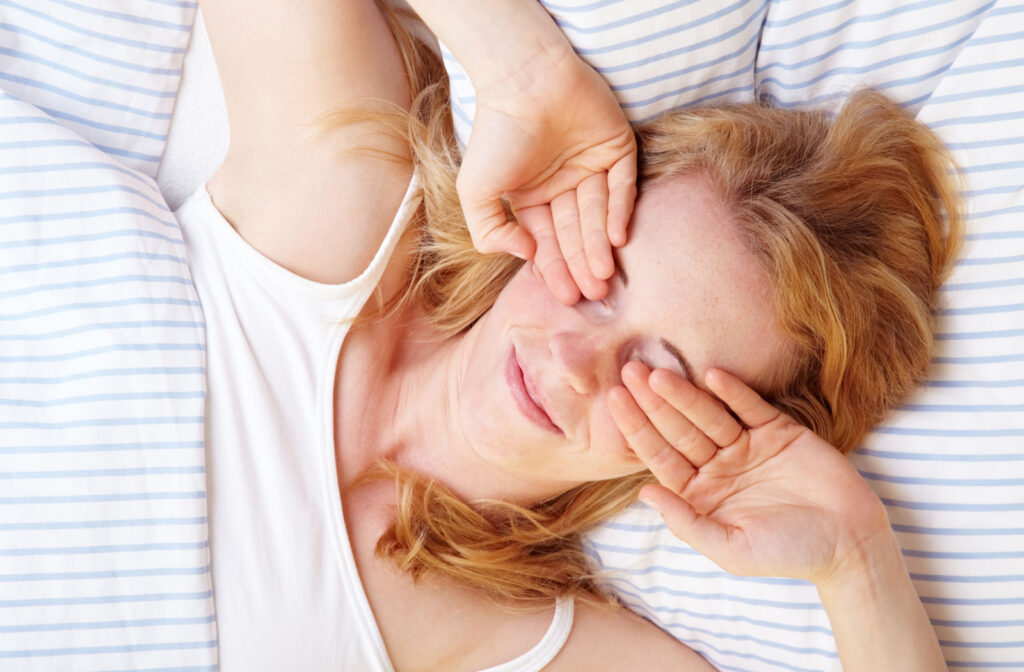Waking up to take on a new day—some people love it, and others aren’t morning people. But it often isn’t just about an alarm blaring in your ear; it’s that burning, dry, uncomfortable sensation in your eyes. If this sounds familiar, you probably wake up with dry eyes. While your optometrist can help with in-office treatment, how can you find at-home relief from dry eye disease?
10 tips for relief from dry eyes include:
- Stay hydrated
- Use warm compresses
- Try eye drops
- Change your sleeping environment
- Take supplements
- Increase humidity
- Avoid tobacco
- Drink less coffee
- Limit screen time
- Visit your optometrist often
What Is Dry Eye?
Dry eye develops when there’s a disruption in your tear film. This can be due to the eyes not producing enough tears, or producing tears of too-poor quality. This can be due to:
- Aqueous deficiency, where the liquids making up a majority of the tear film aren’t being produced in high enough quantities
- A problem with natural oil secretion in the tear film, leading to the tears evaporating too quickly
- Inflammation, causing a disruption in the balance of the tear film
No matter the cause, this leads to the eye being unevenly covered and exposed to the air around you, which often causes:
- Irritation and discomfort
- Burning feelings on the surface of the eye
- Visible redness
- Light sensitivity
- Overly watery eyes (as the eye floods itself with tears that evaporate too quickly)
Many factors can cause this problem with your tear production, including environmental changes, nutritional deficiencies, and hormonal changes.
Can Dry Eye Disease Damage Your Vision?
Your eyes are extremely sensitive. Your tear film exists to protect them, keep the eye hydrated and lubricated, and wash away bacteria and other contaminants. However, when dry eye disease develops, the eye is left unprotected and vulnerable.
Over time, chronic dry eye can lead to all kinds of problems, including:
- Long-term inflammation
- Ulcers caused by bacterial buildup
- Corneal scratches and scarring
This is why it’s essential to do what you can to find relief from your dry eyes.
At-Home Relief for Dry Eye
Remember, many problems can cause dry eye, so don’t just focus on one approach. Instead, make small adjustments here and there to give your body the tools to reduce dry eye symptoms.
Stay Hydrated
Drinking water is essential for overall health, including tear production. Try to make sure you’re drinking enough water to keep your body—and your eyes—hydrated. This can help maintain tear quality and reduce feelings of dryness.
Use an Eye Mask
Using an eye mask, such as the I-Relief, can help find relief. These act as a moist heat therapy solution, which can provide almost immediate relief from discomfort. Consistent use over time can help to:
- Stimulate oil production to improve the quality of your tear film
- Increase blood circulation, which can promote healing and reduce inflammation
- Reduce tear evaporation
Try Eye Drops
Over-the-counter artificial tears can provide immediate relief for mild dryness. Try to look for a bottle labelled “preservative-free.” If you think you’ll need them more often, eye drops with preservatives should be used sparingly.
Just remember that not all eye drops are created equal. It can help to speak with your optometrist to determine what brand might work for you.
Change Your Sleeping Environment
Adjusting your sleeping environment is one of the easiest ways to reduce morning dry eye symptoms. It can help to:
- Use a humidifier
- Make sure no fans or air circulators are pointing at your face
- Close the windows
- Regularly clean your sheets and pillowcases to avoid irritants
Take Supplements
Your eyes need a certain range of nutrients to do their job properly. If you have chronic dry eye, consider taking dry eye nutritional supplements; they can be incredible for reducing inflammation while promoting healthy tear production.
Increase Humidity
If you often work in an environment with constant air conditioning or heating, the forced air circulation can often contribute to dry eye development. Think about changing your work environment or using a humidifier to make things easier for your eyes.
Avoid Tobacco
Tobacco can cause many problems in different parts of your body, and the eyes are no exception to this. Smoking can make dry eye symptoms significantly worse, so it can help to avoid tobacco wherever possible. Besides, quitting or even reducing smoking has plenty of other health benefits.
Drink Less Coffee
Even though caffeine can make a morning easier, it interferes with our sleep habits. Drinking coffee or other caffeinated drinks in the late afternoon or evening can lead to lower-quality sleep, which means your eyes don’t have enough time to recover from the day properly. Try to limit your caffeine intake, especially in the evenings.
Limit Screen Time
We live in an extremely digital world. Screens, cell phones, and computers are everywhere. However, when we use screens, our blink rate decreases significantly. Usually, you blink between 15-20 times a minute. This helps evenly spread a film of tears over your eyes every time.
However, when we’re focusing on screens, this reduces; usually, people only blink between 4-6 times a minute when using screens. By limiting screen time, you can reduce this problem, keeping your eyes protected with a healthy tear film.
Visit Your Optometrist Often
Regular comprehensive eye exams are crucial. During these appointments, your optometrist can help you develop a long-term dry eye management plan. They can also recommend medications or in-office dry eye treatment to help you find relief.

When to Visit Your Optometrist
If you’re living with dry eyes and looking for relief, contact our team here at Lowy & Sewell Eye Care. We can examine your eyes to determine what may be causing your morning dry eye and recommend comprehensive treatment to help you find relief. You don’t deserve to suffer from dry eyes, so book an appointment with our team today!



